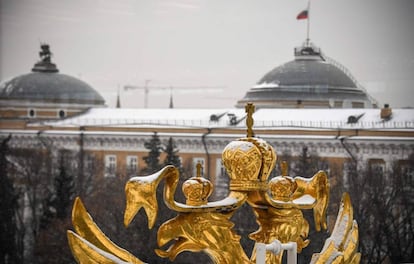Russia, misinformation and social networks
Moscow is still doing what it has always done, but now it is focusing on the negation of democracy

Spain: welcome to the 21st century. It’s now your turn to experience the digital delights of Moscow’s use of bots, hacks, trolls and state media to cause chaos and confusion. The Kremlin has been trying out these tactics among its neighbors for years. As early as 2007, for example, it used a mix of DDOS attacks and fake stories to fan ethnic riots in Estonia and incapacitate the tiny country’s banking and government systems. In Ukraine it used lies on broadcast and social media to polarize the country to such an extent that it paved the way for a covert invasion. In Germany it helped boost anti-immigrant protests by pushing a made-up story about a Russian girl raped by a refugee. Most recently it has even experimented with placing dark ads on Facebook in the US to exacerbate tensions around race and immigration.
It’s an approach that was first honed in the Soviet KGB, who had thousands of agents working on what were known as Active Measures
It’s an approach that was first honed in the Soviet KGB, who had thousands of agents working on what were known as Active Measures: the use of fakes and forgeries to sow discord in the West. Stories ranged from “President Carter’s Secret Plan to Put Black Africans and Black Americans at Odds;” blaming the US for the assassination attempt on Pope John Paul II; blaming the US for a coup attempt against French President De Gaulle; forged letters from the Ku Klux Klan that threatened athletes from African countries… perhaps the most famous was “Operation Infektion,” a carefully concocted story that alleged the CIA had designed the AIDS virus as a weapon.
But there is one great difference between the Kremlin’s activities then and now. Back then the Soviets spent a lot of effort making their lies seem real. Operation Infektion involved medical evidence provided by East German biologists, forged CIA “letters” and a front newspaper in India to place the story in. When the US government accused the Soviets of spreading lies this was met with outraged denial from the Gorbachev regime: how dare they accuse the Soviets of falsehoods?
When Putin denies that Russian soldiers are present in Ukraine he isn’t so much lying as saying facts don’t matter
Today the Putin regime’s disinformation can be very reminiscent of those days, with stories about how the US designed the Ebola virus, or that a secret US base was producing the Zika virus in Ukraine. This time around, however, the Kremlin does not bother with trying to convince anyone its lies are true. It simply pumps the stories out online, and spreads them further with bots. The Kremlin’s “post-fact” approach goes with the grain of today’s media environment. Back in the Cold War there were a limited number of broadcasters and newspapers, a large but just about graspable “information space” where you could contest your version of reality. The information revolution changed all that. Search engines and social media allow people to self-select the news that suits them and to dwell in ever more enclosed echo chambers where truth is whatever you want it to be. Likewise when Vladimir Putin first denies that Russian soldiers are present in Ukraine – and then just as easily admits that they are there after all – he isn’t so much lying in the sense of trying to convince someone of a false reality as saying facts don’t matter.
The only unifying characteristic is hostility and mistrust toward “the system”
Similarly, modern Kremlin propaganda no longer focuses on the left-wing, anti-colonial and labor causes that it cherished during the Cold War. In place of those ideologies is a post-modernist denial of the whole liberal concept of Western society. Democracy is a sham; politicians are crooked and ridiculous. Russian propaganda supports far-left and far-right movements, and any form of protest in between. The only unifying characteristic is hostility and mistrust toward “the system,” the destruction of a public space where evidence-based, deliberative democracy can flourish.
The most catastrophic mistake one can make in responding to the Kremlin’s games is to take actions that exacerbate the very divisions the Kremlin wants to amplify. From Eastern Europe to the US a first reaction has been to accuse anyone whose cause the Kremlin has attached itself to as being some sort of traitor or “useful idiot.” This has only served to help the Kremlin, falling for the apple of discord it has thrown in the room. If the Kremlin’s aim is to help destroy trust – the challenge is how can one rebuild it.
Peter Pomeranzev is a Senior Visiting Fellow at the Institute of Global Affairs and Co-Director of the Arena Program at the London School of Economics.
Tu suscripción se está usando en otro dispositivo
¿Quieres añadir otro usuario a tu suscripción?
Si continúas leyendo en este dispositivo, no se podrá leer en el otro.
FlechaTu suscripción se está usando en otro dispositivo y solo puedes acceder a EL PAÍS desde un dispositivo a la vez.
Si quieres compartir tu cuenta, cambia tu suscripción a la modalidad Premium, así podrás añadir otro usuario. Cada uno accederá con su propia cuenta de email, lo que os permitirá personalizar vuestra experiencia en EL PAÍS.
¿Tienes una suscripción de empresa? Accede aquí para contratar más cuentas.
En el caso de no saber quién está usando tu cuenta, te recomendamos cambiar tu contraseña aquí.
Si decides continuar compartiendo tu cuenta, este mensaje se mostrará en tu dispositivo y en el de la otra persona que está usando tu cuenta de forma indefinida, afectando a tu experiencia de lectura. Puedes consultar aquí los términos y condiciones de la suscripción digital.








































